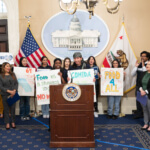Despite some positive advances, in his final May Revise Budget Governor Jerry Brown missed a significant opportunity to make tangible impacts on low-income Californians access to affordable, healthy food.
In the face of a growing, multi-billion dollar surplus (currently at $8.8 billion), Brown has largely chosen to sock away additional billions into the state Rainy Day Fund, along with a few spending augmentations over the January budget.
The Legislature should now take this critical opportunity to work with the Administration to refocus attention on the millions of Californians living in or near poverty struggling to get by and put food on the table. As they work to negotiate a final budget, we must rely on the Budget Committees and legislative leadership to invest more money to improve food access.
Look for urgent calls to action and updates in the days and weeks ahead!
A summary of the 2018-19 Governor’s May Revise Budget in regards to food access:
CalFresh and Community Food Access: No new investments were made in CalFresh, though the May Revise continues a January funding proposal for CalFood to provide fresh produce to food banks.
The Legislature has the opportunity to negotiate a modest one-time investment to pilot a market-based approach to healthy food access through the California Fruit and Vegetable EBT Pilot. Take action to urge Budget Leaders to work with the Governor to fund this pilot initiative to provide matching CalFresh EBT benefits upon the purchase of fresh, California-grown fruits and vegetables! link
Early Childhood Nutrition: While we appreciate the investments dedicated to early childhood development, we need to see a greater commitment to bring back access to healthy meals for low-income children in child care. Funding for Food with Care is vital not only to the health, well-being, and future of our youngest learners, but also to the providers who care for them.
When Governor Brown first cut funding for food in child care, child care providers were forced to make a choice: shoulder the cost of the lost funds and pull from other parts of already limited budgets, or cut the meal programs altogether. Some dropped the meal program, but others cut into their own already-limited finances. Since the recession, our state has made strategic investments to build back our child care system, but funding for food has continued to be ignored. When our child care providers don’t have adequate funds for food, we undermine our own efforts to increase funding for early education. With the state’s financial house back in order, now is the time to act. link
Child Nutrition and Poverty: The May Revise neglected to take action to end childhood deep poverty by restoring the CalWORKS grant increase up to the federal poverty line. While the May Revise fully funds K-12 education through the Local Control Funding Formula, and includes other one-time investments in K-12 education, no new funding or policy proposals were included in regards to nutrition or school food.
Take action to urge Budget Leaders to extend state funding for successful and popular Breakfast After the Bell Startup and Expansion Grant Fund, which prioritizes high-poverty schools. These grant funds were in high demand, and will be exhausted next month unless the Legislature and the Governor take action to extend them. link
Californians on SSI/SSP: The May Revise did not increase grants for Californians receiving SSI/SSP, despite value of the grants dropping below the federal poverty level. It also left out any proposal to end the “cash-out” policy that makes those receiving SSI/SSP ineligible for CalFresh. The Legislature directed the Department of Social Services to develop fiscal estimates of the cost to end the Calfresh-SSI “cash-out” policy without harming families with a mix of SSI and CalFresh recipients, but these estimates have not yet been made public.
There were a few bright spots in this May Revise Budget for 2018-19, in addition to continuing the proposed investments made in the Governor’s January budget.
Homelessness is a key area of additional investments in the May Revision, with over $350 million General Fund in increased spending proposed for 2018-19, in addition to the No Place Like Home proposal. While a significant boost over current state spending, the Governor’s May proposal falls short of the bold pending investments proposed by the Legislature. With exploding housing costs that far exceed the nation’s, it is impossible to address issues of poverty and hunger without addressing California’s lack of affordable or stable housing.
The Governor’s May Revise proposal to strengthen the California Earned Income Tax Credit (CalEITC) is a big win for low-income working Californians. It expands eligibility for CalEITC to young adults and seniors who are currently excluded, broadening the reach and impact of this important credit. However, the proposal notably excluded working immigrant Californians who file taxes using an ITIN. CalEITC is one of the most effective tools we have to combat poverty and lift up low-wage working families- we should ensure it works for all Californians.
For an analysis of the 2018-19 May Revision Budget, visit the California Budget and Policy Center. link
Read the Governor’s May Revise Budget Summary link
Questions? Contact Tracey Patterson at 510.433.1122 ext 101 or tracey@cfpa.net




